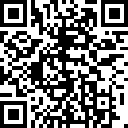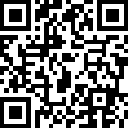You are visiting the website that is operated by Ultima Markets Ltd, a licensed investment firm by the Financial Services Commission “FSC” of Mauritius, under license number GB 23201593. Please be advised that Ultima Markets Ltd does not have legal entities in the European Union.

The non-farm payrolls have passed, the inflation data has come, and the dollar is still in decline
TOPIKTags: news
August 7, 2023 at 1:53 am
Last Friday, August 4th, the U.S. nonfarm payrolls data fell short of expectations for the second consecutive month. According to the data released by the U.S. Department of Labor, the seasonally adjusted non-agricultural employment in the United States increased by 187,000 in July, the lowest number of new jobs since December 2020, compared with market expectations of 200,000.
Previously, new job figures for May and June were revised down as well. The May’s number was revised down from 339,000 to 306,000 and the June’s down to 185,000. It is worth noting that ADP, the identical twin of non-agricultural employment data, also showed a downward trend in August, and this time it did not show the opposite trend to the nonfarm payrolls data. The divergence in the first two months made the reference value of ADP to decrease.
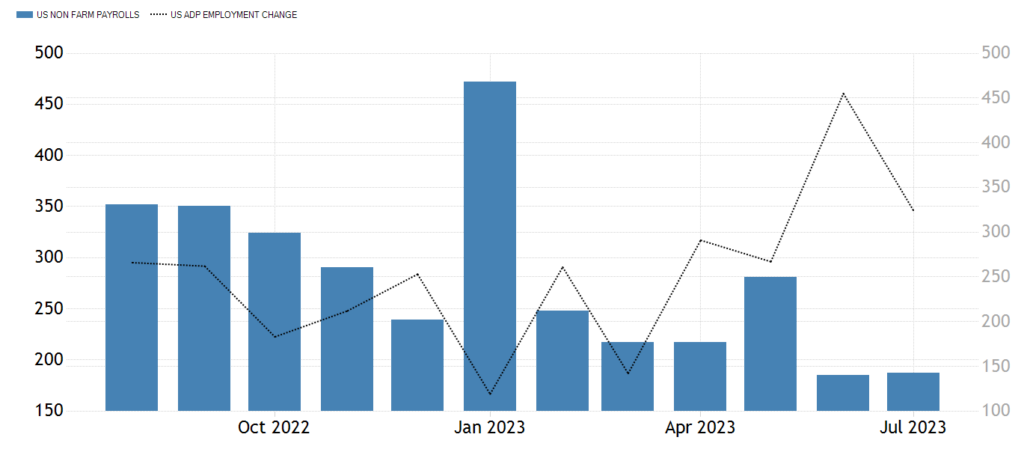
(Blue column vs black line; non-farm payrolls vs ADP)
On the other hand, the unemployment rate eased to 3.5% from 3.6 % in June. In addition, the hourly wage continued to record steady growth in July, increasing by 4.4% year-on-year, beating expectations of 4.2%. The increase in hourly wages may not be what the FED wants to see because of its 2% inflation target.
Elon, analyst at Ultima Markets Investment Research Group, said “In general, the FED’s continued tightening policy has begun to take effect in the labor market, and the decline in the number of new jobs for two consecutive months represents the beginning of cooling job market. As a result, the consensus for rate hike in September has not changed significantly.
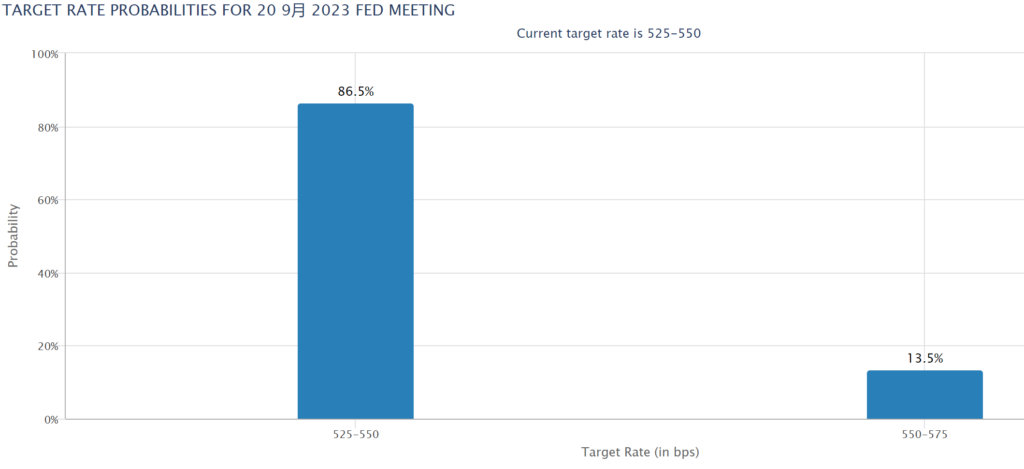
(The chance that the Fed will not raise interest rates stays at nearly 90%, sourced from the Fed Interest Rate Observation Tool)
Gold and non-US currencies altogether is happy with the expectation of the Fed’s move to leave interest rates unchanged. It is important to watch out for inflation data this week. Last month, the inflation rate returned to 3%. If the inflation continues cooling, the dollar will go downwards again.
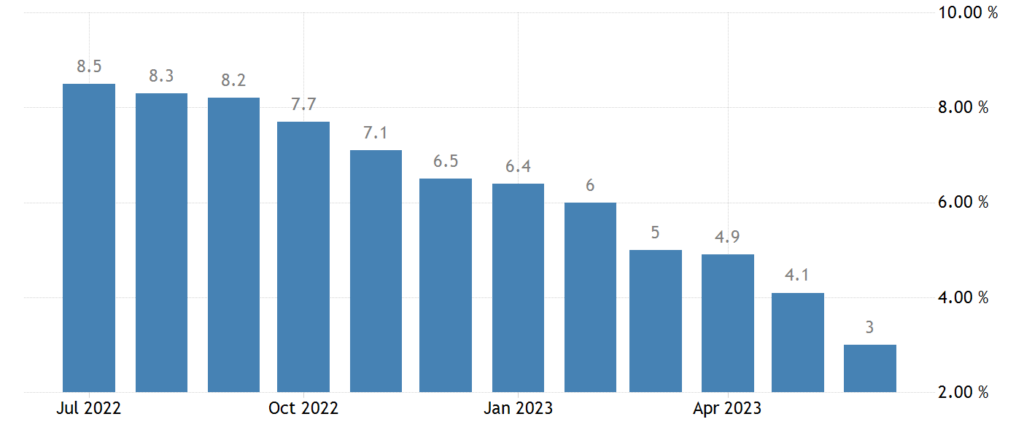
(CPI rates in one year)
Technically, the euro finds its support on the back of 1.09, rising above the 65-day moving average and the 5-day moving average again. The Stochastic Oscillator is also showing a golden cross gesture, suggesting an underlying bullish trend. If the euro breaks through the peak last week, it will expectedly resume an uptrend.
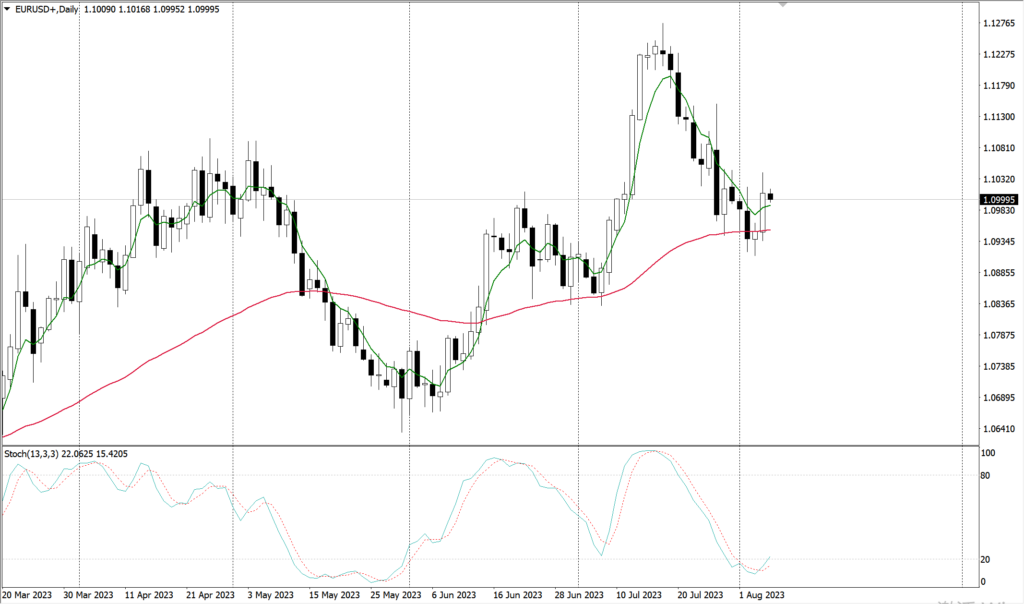
(Daily chart of EUR/USD, Ultima Markets MT4)
Disclaimer
Comments, news, research, analysis, price, and all information contained in the article only serve as general information for readers and do not suggest any advice. Ultima Markets has taken reasonable measures to provide up-to-date information, but cannot guarantee accuracy, and may modify without notice. Ultima Markets will not be responsible for any loss incurred due to the application of the information provided.
Mengapa Berdagang Logam & Komoditi dengan Ultima Markets?
Ultima Markets menyediakan persekitaran kos dan pertukaran yang paling kompetitif untuk komoditi lazim di seluruh dunia.
Mohon sekarangMemantau pasaran secara terus
Pasaran terdedah kepada perubahan dalam penawaran dan permintaan
Menarik kepada pelabur yang hanya berminat dalam spekulasi harga
Kecairan mendalam dan pelbagai tanpa yuran tersembunyi
Tiada dealing desk dan tiada sebut harga semula
Pelaksanaan pantas melalui pelayan Equinix NY4
Sertai ekosistem perdagangan terbaik
Undang-undang
Ultima Markets merupakan ahli The Financial Commission, sebuah badan bebas antarabangsa yang bertanggungjawab untuk menyelesaikan konflik dalam pasaran Forex dan CFD.
Semua pelanggan Ultima Markets dilindungi dibawah perlindungan insuran daripada Willis Towers Watson (WTW), syarikat insuran antarabangsa yang ditubuhkan pada 1828, layak untuk tuntutan sehingga US$1,000,000 setiap akaun.
Ultima Markets ialah broker CFD pertama yang menjadi sebahagian daripada United Nations Global Compact.
Pendedahan Risiko
Amaran Risiko:Berdagang Forex dan CFD membawa risiko kerugian lebih besar daripada pelaburan awal anda dan berdagang berdasarkan dana yang mampu. Anda tidak memiliki atau mempunyai sebarang hak ke atas aset yang mendasari derivatif (seperti hak untuk menerima pembayaran dividen). Pastikan anda memahami sepenuhnya risiko yang terlibat. Berdagang produk berleveraj mungkin tidak sesuai untuk semua pelabur. Sebelum berdagang, sila ambil kira tahap pengalaman anda, objektif pelaburan dan dapatkan nasihat kewangan bebas jika perlu. Sila pertimbangkan dokumen undang-undang kami dan pastikan anda memahami sepenuhnya risiko sebelum anda membuat sebarang keputusan perdagangan.
Amaran Nasihat Am:Maklumat di laman web ini adalah bersifat umum sahaja dan sebarang nasihat telah disediakan tanpa mengambil kira objektif, keadaan kewangan atau keperluan anda. Sehubungan itu, sebelum bertindak atas nasihat tersebut, anda harus mempertimbangkan kesesuaian sebarang nasihat dengan mengambil kira objektif, keadaan kewangan dan keperluan anda, dan selepas mempertimbangkan dokumen undang-undang.
Sekatan Serantau:Maklumat atau peranti di laman web ini tidak ditujukan atau ditawarkan kepada penduduk di bidang kuasa tertentu seperti Amerika Syarikat, Korea Utara dan lain-lain. Untuk maklumat lanjut, sila hubungi pasukan sokongan pelanggan Ultima Markets.
Nama dagangan Ultima Markets Ltd, diberi kuasa dan dikawal selia oleh Suruhanjaya Perkhidmatan Kewangan 'FSC' Mauritius sebagai Peniaga Pelaburan (Penjual Perkhidmatan Penuh, tidak termasuk Pengunderaitan) (No. lesen GB 23201593). Alamat pejabat berdaftar: Tingkat 2, The Catalyst, 40 Silicon Avenue, Ebene Cybercity, 72201, Mauritius.
hak cipta © 2025 Ultima Markets Ltd. Hak cipta terpelihara.
-
Messenger
Continue on Messenger
Take the conversation to your Messenger account. You can return anytime.
Scan the QR code and then send the message that appears in your Messenger.
Open Messenger on this device. -
Instagram
Continue on Instagram
Take the conversation to your Instagram account. You can return anytime.
Scan the QR code to open Instagram. Follow @ultima_markets to send a DM.
Open Instagram on this device. -
Live Chat
-





